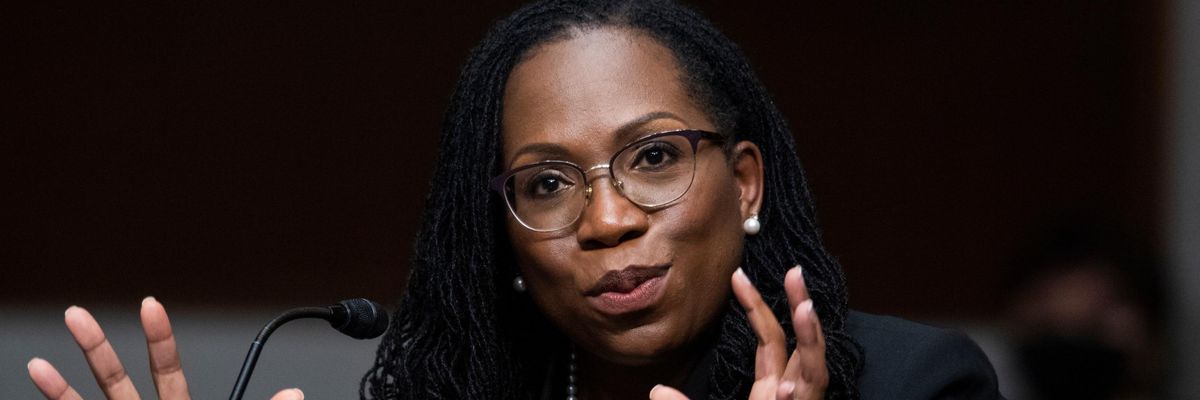In the days since Justice Stephen Breyer announced he will retire, there has been much discussion of whether President Joe Biden should look for a nominee who would mirror Breyer's background and approach. But as a civil rights lawyer, I see this as an opportunity for the President to appoint someone who would bring to the nation's highest Court a perspective and background similar to two of the best Supreme Court justices in our nation's history: Thurgood Marshall and Ruth Bader Ginsburg.
Marshall and Ginsburg were pathbreakers, as Biden's nominee herself will be. They are notable not only because they helped bring important racial and gender diversity to the Court but--most importantly--because they brought to the Court a diversity of perspective that today is sorely missing: the experience of representing ordinary people fighting for their rights in a system dominated by corporate interests.
Today's Supreme Court is in dire need of justices who bring experience representing ordinary people in a system stacked in favor of the rich and the powerful.
Today's Supreme Court is in dire need of justices who bring experience representing ordinary people in a system stacked in favor of the rich and the powerful. While criminal justice cases make up a substantial portion of the federal judicial docket--and the Supreme Court issues consequential decisions on the rights of defendants and the fairness of the criminal justice system--there has not been a justice with significant criminal defense experience since Justice Marshall left the Court in 1991. And there has never been a justice with experience as a public defender.
In contrast, all of the current Supreme Court justices are either former government attorneys, prosecutors, or have spent the bulk of their careers representing corporations. A judge's past work does not necessarily dictate their decision in any individual case, but it undoubtedly shapes their perspective on the law. Right now--at a time when issues of fairness, justice, and inequality are at the forefront of our legal and policy debates--the Court needs someone--like Justice Marshall or Justice Ginsburg--who has represented people who have too often gone unheard in our legal and justice systems.
To bring this fresh and necessary experience to the bench, Biden should nominate Judge Ketanji Brown Jackson. Recently promoted to a seat on the powerful D.C. Circuit, Judge Jackson brings impeccable credentials as a graduate of Harvard Law School, a former Supreme Court clerk, and a well-regarded federal district and appellate court judge. But the experiences that set her apart are her time working as a public defender and serving as the vice-chair of the U.S. Sentencing Commission.
As a public defender, Judge Jackson represented people who had been accused of committing a crime but could not afford a lawyer to represent them in the criminal legal proceeding. Often underrecognized in the status-hierarchy of America's legal profession, public defenders play an indispensable role in making sure that the criminal justice system works as our laws intend it to: as a forum where fair decisions about guilt and innocence can be determined because everyone--rich and poor--has their constitutional rights protected. Public defenders also get a first-hand look at the ways that important decisions made by the Supreme Court play out in the lives of vulnerable people.
Judge Jackson brings to her work the experiences of working with some of the most vulnerable people in the criminal justice system. Asked about her public defense experience at her confirmation hearing for the D.C. Circuit, Jackson recalled working on appeals with clients who didn't really understand what had happened during their trials. "They'd just been through the most consequential proceeding in their lives, and no one really explained to them what they were supposed to expect," she said. As a judge, she added, she is intentional about addressing this gap. "I speak to [defendants] directly and not just to their lawyers. I use their names. I explain every stage of the proceeding, because I want them to understand what's going on. ... it's only if people understand what they've done, why it's wrong, and what will happen to them if they do it again that they can really start to rehabilitate."
Appointing someone with Judge Jackson's experience is also in line with Biden's own track record on judicial nominations. While in the past, civil rights lawyers and public defenders have seldom been nominated by presidents of either party, in just his first year Biden has broken records for appointing the most public defenders to the appellate bench. Biden, himself, the first former public defender to serve as president, seems to understand that working with people going through the most challenging time in their lives builds the kind of perspective and understanding that we so desperately need more of in our legal system.
Someone with Judge Jackson's legal credentials undoubtedly had her pick of top jobs within the profession, and the fact that she chose to dedicate part of her career to representing people who otherwise could not afford a lawyer tells us a lot about who she is as a person. It tells us she is not only brilliant but also committed to making equal justice under the law a reality; that she brings not only a sharp legal mind, but an understanding of how abstract legal concepts shape the lives of ordinary people. At a time when our Supreme Court increasingly hears the voices only of the rich and the powerful, Ketanji Brown Jackson is the justice we need.
